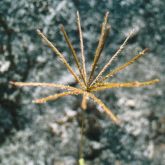Rhodes grass

Rhodes grass seed head
© Queensland Government

Rhodes grass plant form
© Queensland Government

Rhodes grass head, stem and root
© Queensland Government
Native to southern and eastern Africa, Rhodes grass is a perennial or annual grass that is widely grown in tropical countries as a pasture species.
Rhodes grass can invade rainforest fringes and smother native ground cover species. It is found in parts of South East Queensland.
Rhodes grass is not a prohibited or restricted invasive plant under the Biosecurity Act 2014.
Scientific name
Description
- Perennial or annual grass 60–160cm tall.
- Leaf blades are flat or folded 12.5–45cm long and 1–2cm wide.
- Inflorescences have 6–15 one-sided spikes, clustered at end of stem.
- Spikes are 5–10cm long with numerous green spikelets, turning copper-brown when mature.
Habitat
- Prefers tropical and subtropical areas with rainfall ranging from 600–1600mm annually.
- Tolerates drought and salt.
- Found along roadsides, railways, disturbed areas and footpaths.
Distribution
- Found in areas in South East Queensland.
Life cycle
- Produces 3–4 million seeds per kilogram.
- Flowers during summer and autumn.
Impacts
Environmental
- Invades rainforest fringes.
- Smothers native ground cover species.
How it is spread
- Spread by rhizomes, rooting stolons and seeds.
Prevention
Control
Physical control
- Dig out larger clumps with a mattock or similar tool.
Herbicide control
- Susceptible to several herbicides.
Read the Rhodes grass fact sheet (PDF, 3.6MB) for herbicide control and application rates.
Biological control
- No known biological control agent.
Legal requirements
- Rhodes grass is not a prohibited or restricted invasive plant under the Biosecurity Act 2014. However, by law, everyone has a general biosecurity obligation (GBO) to take reasonable and practical steps to minimise the risks associated with invasive plants and animals under their control.
- Local councils must have a biosecurity plan that covers invasive plants and animals in their area. This plan may include actions to be taken on certain species. Some of these actions may be required under local laws. Contact your local council for more information.